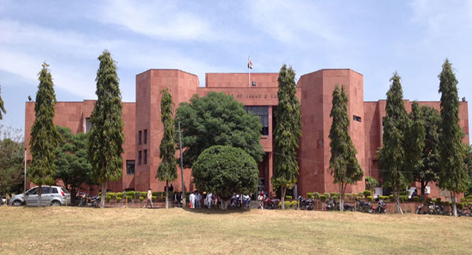‘Ensure speedy trial of criminal cases against sitting, ex-MPs, MLAs’
*HC to review progress after regular intervals
Mohinder Verma
JAMMU, Sept 26: In a major development, High Court has directed the Judicial Officers of the Union Territories of Jammu and Kashmir and Ladakh to expeditiously dispose of pending corruption cases and ensure speedy trial in criminal cases involving sitting and former Members of Parliament and Legislators.
The directions have been issued as the Chief Justice Gita Mittal has noticed not up-to-the mark progress in disposal of such cases even several years after issuance of circular instructions on both these important aspects.
Vide Circular No.4 dated March 30, 2015, the High Court of the then State of Jammu and Kashmir had through the then Registrar General asked all the Special Judges of Anti-Corruption Courts to dispose of the corruption cases in a time bound manner, on priority basis and submit the quarterly status report, stage-wise with regard to the such pending matters to the Registry.
However, there was no strict compliance to the explicit directions as a result of which High Court was compelled to issue fresh instructions. “The Circular No.4 dated March 30, 2015 appears not to have been followed strictly as no such information has been made available”, the High Court had mentioned in Circular No.20 dated December 16, 2015.
“The Chief Justice has desired that all such information be provided to the Registry within a week’s time. Any deviation on that count will be treated as indiscipline and shall be reflected in the Annual Confidential Reports (ACRs) of the Presiding Officers of each such court”, the High Court had made it clear in the Circular of December 2015.
Similarly, in compliance with the directions of the Supreme Court passed in Writ Petition No.536 of 2011 in the matter of ‘Public Interest Foundation and Others Versus Union of India and Another’ all Trial Courts of the then State of Jammu and Kashmir were impressed upon vide Circular No.3 dated August 20, 2014 to ensure that trial in cases involving sitting MPs and MLAs against whom charges have been framed for the offences specified in Section 8(1), 8(2) and 8(3) of the Representation of People’s Act is concluded as speedily and expeditiously as possible and in no case later than one year from the date of framing of charges.
The Supreme Court had directed that trial in such cases, as far as possible, should be conducted on day-to-day basis and in case, owing to some extraordinary circumstances, any court is not able to conclude the trial within one year from the date of framing of charge, such court shall submit a report indicating special reasons for not adhering to the time limit and delay in conclusion of the trial to the High Court which shall be placed before the Chief Justice concerned for soliciting appropriate directions to the concerned court regarding extending the time for conclusion of the trial.
Thereafter, in pursuance of the directions dated December 4, 2018 passed by the Supreme Court in Writ Petition titled Ashwani Kumar Upadhyay Versus Union of India and Another, the J&K High Court vide Circular No.96 dated December 11, 2018 had directed all the courts before whom criminal cases involving former and sitting legislators were pending to fix a calendar for each of these cases to be taken up on day-to-day basis giving priority to the trial of the cases.
As compliance to these circular instructions on corruption cases and criminal cases involving former and sitting MPs and Legislators has remained beyond satisfaction, on the instructions of the Chief Justice Gita Mittal, the Registrar General Jawad Ahmed has through Circular No.25 dated September 24, 2020 drawn the attention of all the Judicial Officers of J&K and Ladakh Union Territories to previous instructions and asked them to ensure that they strictly abide by the same.
The copies of earlier circulars and the latest one have been furnished to all the Principal District Judges of both the UTs with the request to circulate the same among the Judicial Officers within their jurisdiction for strict compliance.
“Now, all the Special Judges Anti-Corruption Courts are required to expeditiously dispose of corruption cases pending before them while as courts dealing with criminal cases against former and sitting MPs and legislators have to ensure speedy trial as High Court has decided to monitor the progress after regular intervals”, sources in judiciary said.
As far as criminal cases involving former and sitting legislators are concerned, the courts have to give priority to the trial of the cases involving offences punishable with imprisonment for life/death; serious offences punishable with imprisonment of five years or more and other offences.


